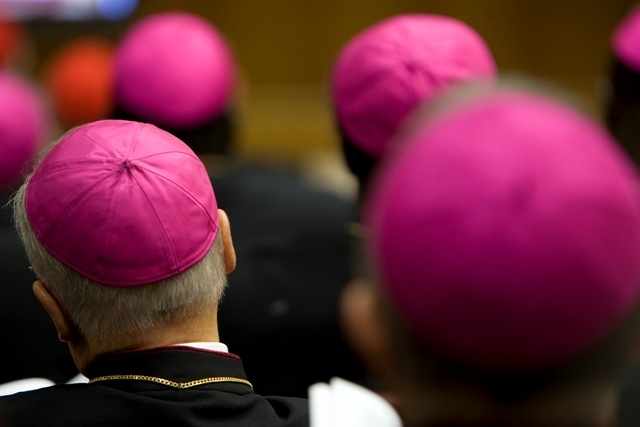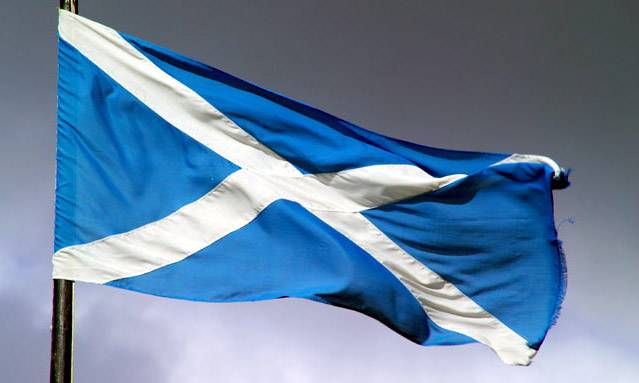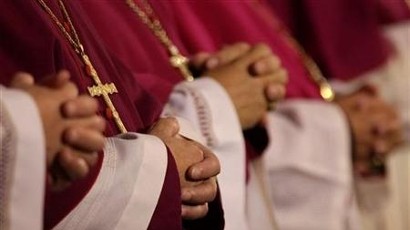Commentary…
In early July, Archbishop Jose H. Gomez of Los Angeles opposed a modest piece of legislation that requires schools in that state to include lesbians, gays, bisexuals, and transgender people, and other previously excluded groups, in their social studies curricula.
The archbishop argued that he was merely supporting parents’ rights to make decisions regarding their children’s education. But Catholics who pay attention to our bishops’ energetic campaign to thwart any legislation that legitimizes (or in this instance, even recognizes) same-gender attraction are familiar with this ruse.
Our hierarchy has a habit of invoking noble sounding principles but applying them only when they can be used against lesbian, gay, bisexual, and transgender people.
Cardinal Donald Wuerl of Washington did something similar last year when he announced that the legalization of same-sex marriage in the District of Columbia had forced him to stop offering health insurance to the spouses of new employees of Catholic Charities. The marriage equality law, he explained, would force him to extend benefits to gay and lesbian couples, and since this violated the church’s teaching on marriage, he could not do it.
There is Sin, and then There is Gay Sin
To take this argument seriously, one has to overlook the fact that Catholic Charities already offered benefits to the spouses of employees who had not been married in the Catholic Church, or who had been remarried without benefit of an annulment. These are also clear violations of the Church’s teaching on marriage. But Wuerl’s harsh and unloving stance is typical of a hierarchy that behaves as though there is sin, and then there is gay sin—and gay sin is much worse.
Catholics faithful to the scriptural admonition to love mercy, do justice, and walk humbly with their God, have become increasingly alienated by bishops who seem obsessed with pushing a narrow anti-gay agenda to the exclusion even of simple charity. Our bishops were in the small minority of religious leaders who failed to speak out when a wave of anti-gay bullying, some of which led to suicides, swept the country last year. At a time when seemingly every organization in the United States was finding a way to tell young lesbian, gay, bisexual, and transgender (LGBT) people that “It Gets Better,” our hierarchy, to our shame, was silent.
In their zeal to deny any form of legitimacy to same-sex relationships, the bishops have neglected more urgent pastoral duties. Catholic schools and parishes are closing by the dozen in dioceses across the country, yet somehow the hierarchy and its allies in the Knights of Columbus have found millions of dollars to spend in one state after another opposing marriage equality, or its weaker cousin, the civil union.
Leaders Without Followers
The rhetoric our bishops employ in these campaigns is hardly pastoral. Archbishop Timothy Dolan of New York, referred to same-sex marriage as “an Orwellian nightmare” and an “ominous threat.” He compared his state’s government to North Korea’s during New York’s recent debate on marriage equality. Then, upon losing the debate, this prince of the Church, with a palace on Fifth Avenue, proclaimed himself a victim of intolerance.
We are well acquainted with the history of anti-Catholic bigotry in this country, and keenly aware of what our forebears in the faith suffered at the hands of hateful fellow citizens. But we find it reprehensible when that legacy is invoked by those who themselves advocate discrimination and repression. If you are the Catholic parent of LGBT daughter or son, you know firsthand that it is your child’s sexual identity, and not a belief in the Immaculate Conception, that puts them at risk for beatings and taunting. Archbishop Dolan and his colleagues should stop pretending that they face anything like the intolerance that our children do.
A Gay-Friendly Church?
The one fortunate aspect of the bishop’s campaign against LGBT people is that it has been singularly ineffective. Polling by the Public Religion Research Institute makes clear that almost three-quarters of Catholics support either marriage equality or civil unions, and that we back legal protections for LGBT people in the workplace (73 percent), in the military (63 percent), and in adoptions (60 percent) by significant margins.
We are, in other words, an extremely gay-friendly church; and while it has taken a while for this fact to filter out beneath the bluster of our bishops and their lobbyists, political leaders have begun to take note. A Catholic governor and Catholic legislators made marriage equality a reality in New York. A Catholic governor and legislators passed civil unions into law in Illinois. Heavily Catholic Rhode Island passed a civil union bill over the protests of Bishop Thomas Tobin of Providence, and a Catholic governor has promised to permit same-sex couples to marry in Maryland, if the legislature will only put the bill on his desk.
A few days after Archbishop Gomez announced his opposition to the legislation requiring California schools to give an accurate recounting of the nation’s history. Gov. Jerry Brown, a Roman Catholic, signed it into law.
Those of us who support equality for LGBT people in civil society do so not in spite of our Catholic faith but because of it. We learned in childhood that Jesus moved freely among the outcast and the marginalized, that he warned his followers to judge not lest they be judged, and that he taught that our neighbor was not the priest who passed the beaten traveller on the other side of the road to avoid ritual impurity, but the hated Samaritan who bound up his wounds, and paid for his care.
We learned later that the Church’s teachings on social justice compelled us to act as advocates for fairness, justice, and individual dignity, that its teachings on politics instructed us to vote for the common good, and that in making moral decisions, we were to follow the promptings of our own well-formed consciences.
There are times, it seems, when our hierarchy is so committed to cultivating political power, and deploying our Church’s resources in contemporary culture wars, that they expect us to forget all of this. We won’t.
As Philadelphia Burns
Last week, the Vatican announced that it had appointed Archbishop Charles Chaput of Denver as the new archbishop of Philadelphia. The clergy abuse scandal that has badly damaged the hierarchy’s credibility is still spinning out of control in Philadelphia, and Pope Benedict XVI clearly thinks that Archbishop Chaput is the right man for a difficult job.
We would only note that in his previous post, he supported a parish priest who expelled a girl from a Catholic school because her parents were lesbians. The archbishop argued that parents must be able to cooperate with Catholic schools in the education of their children, and that those who do not embrace Church doctrine cannot do so.
This was not an argument he employed against Protestants, or non-Christians, or children whose parents had remarried after a divorce. It was employed exclusively against lesbian parents. Because in the theological universe that our bishops are constructing to support their personal biases, there is sin, and then there is gay sin, and gay sin is so much worse.
http://tinyurl.com/3htna7s





